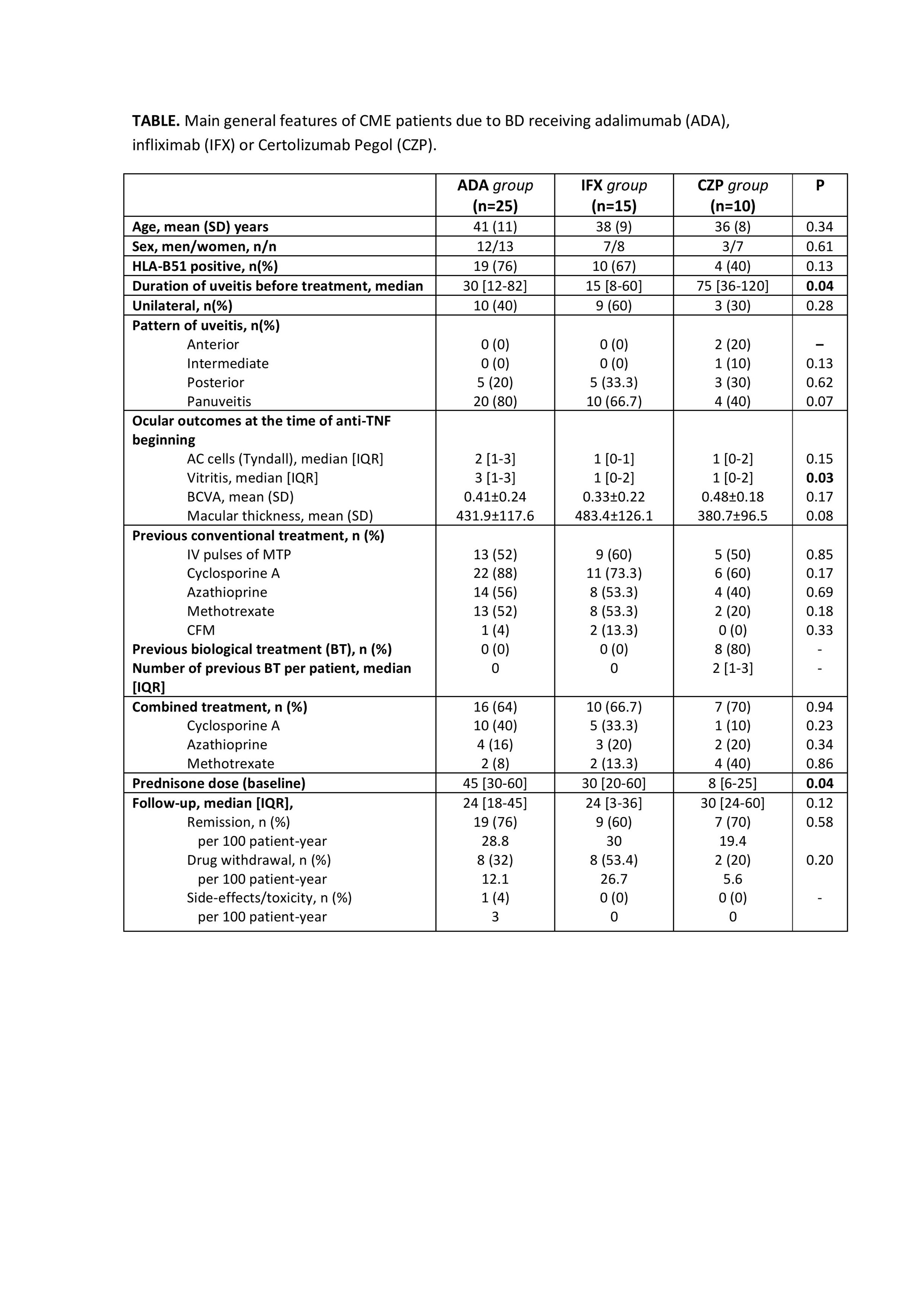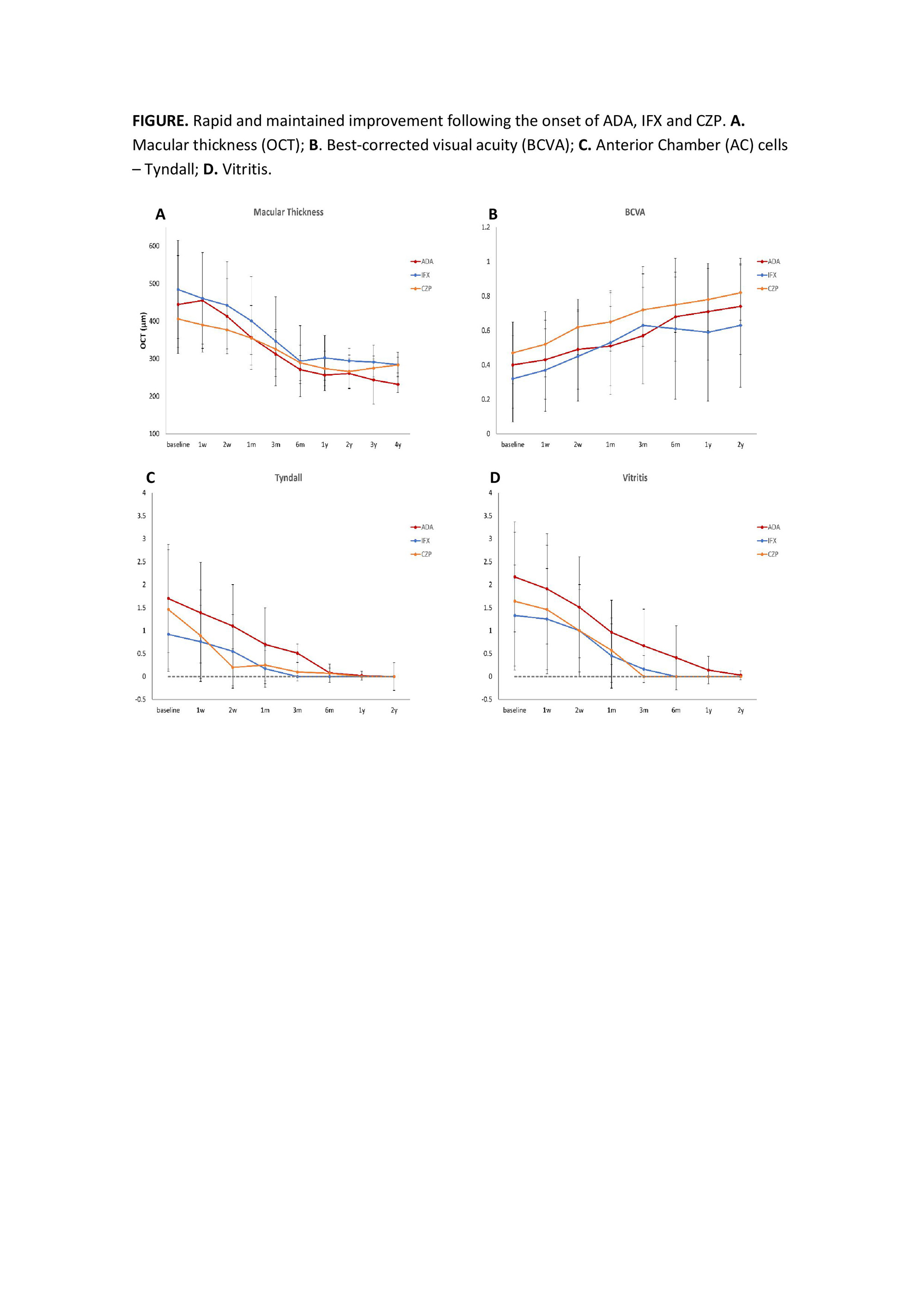Session Information
Date: Monday, November 13, 2023
Title: (1554–1578) Vasculitis – Non-ANCA-Associated & Related Disorders Poster II
Session Type: Poster Session B
Session Time: 9:00AM-11:00AM
Background/Purpose: Cystoid macular edema (CME) is the leading cause of blindness in non-infectious uveitis. One of the most frequently associated conditions is Behçet’s disease (BD) (1-3). The objective is to compare efficacy and safety of Adalimumab (ADA), Infliximab (IFX) and Certolizumab (CZP) in CME refractory due to BD.
Methods: Multicenter study of patients with CME secondary to BD refractory to glucocorticoids (GC) and at least 1 conventional immunosuppressant. All patients had CME (OCT >300µ) at baseline. From baseline up to 2 years of follow-up, the evolution of macular thickness (µm), visual acuity (BCVA), anterior chamber (AC) cells, vitritis and GC-sparing effect was analyzed to assess the efficacy of ADA, IFX and CZP. Statistical analysis was performed with IBM SPSS Statistics v.23.
Results: Fifty patients (78 eyes) were evaluated. Twenty-five patients were treated with ADA, 15 with IFX and 10 patients received CZP. No significant differences in demographic parameters were identified in all groups. However, patients in the CZP group had a significantly longer time from diagnosis to drug initiation (75 [36-120] vs 30 [12-82] vs 15 [8-60] months; p=0.04) and had received a greater median [IQR] number of biological treatments (2 [0.75-3] vs 0 [0-0] vs 0 [0-0]) than the ADA and IFX groups. In CZP group, ADA and IFX were used previously in 7 patients. ADA was used in combined therapy in 64%, IFX in 66.7% and CZP in 70% of patients (p=0.94) (TABLE).
Concerning efficacy outcomes, a rapid and maintained improvement in macular thickness was observed after 2 years of follow-up in three groups with no statistically significant differences between them (FIGURE). Improvement in BCVA, AC cells, vitritis and a GC-sparing effect was also noted. No serious adverse events were observed in IFX and CZP group. One case of pyelonephritis was reported in the ADA group.
Conclusion: ADA, IFX and CZP are effective and safe in refractory CME due to BD. CZP appears effective even in patients with inadequate response to ADA and/or IFX.
To cite this abstract in AMA style:
Barroso-Garcia N, Martin-Varillas J, Sanchez-Bilbao L, Ferraz Amaro I, Calvo Río V, Adán A, Hernanz-Rodriguez I, Beltran-Catalan E, Diaz-Valle D, Hernandez-Garfella M, Martinez-Costa L, Diaz-Llopis M, Herreras J, Maiz-Alonso O, Torre-Salaberri I, Atanes Sandoval A, Insua-Vilariño S, Almodovar R, Fanlo-Mateo P, De Dios J, Garcia-Aparicio A, rodriguez-Montero S, Jovani V, Moya P, Peña Sainz-Pardo E, Hernandez J, Blanco R. Comparison of Treatment with Adalimumab, Infliximab and Certolizumab in Refractory Cystoid Macular Edema Due to Behçet Disease [abstract]. Arthritis Rheumatol. 2023; 75 (suppl 9). https://acrabstracts.org/abstract/comparison-of-treatment-with-adalimumab-infliximab-and-certolizumab-in-refractory-cystoid-macular-edema-due-to-behcet-disease/. Accessed .« Back to ACR Convergence 2023
ACR Meeting Abstracts - https://acrabstracts.org/abstract/comparison-of-treatment-with-adalimumab-infliximab-and-certolizumab-in-refractory-cystoid-macular-edema-due-to-behcet-disease/


